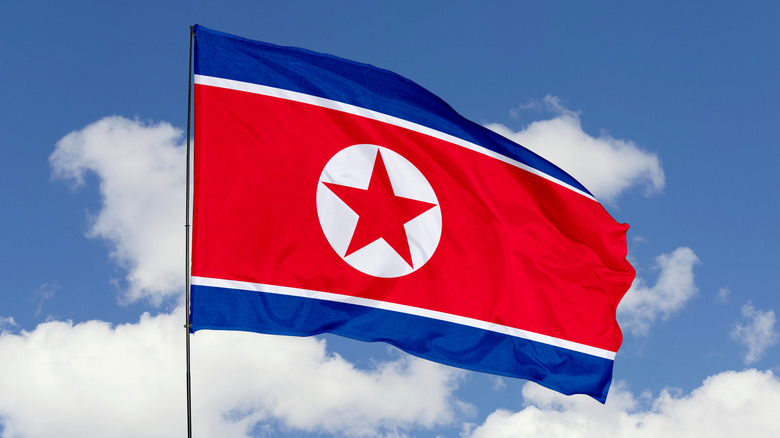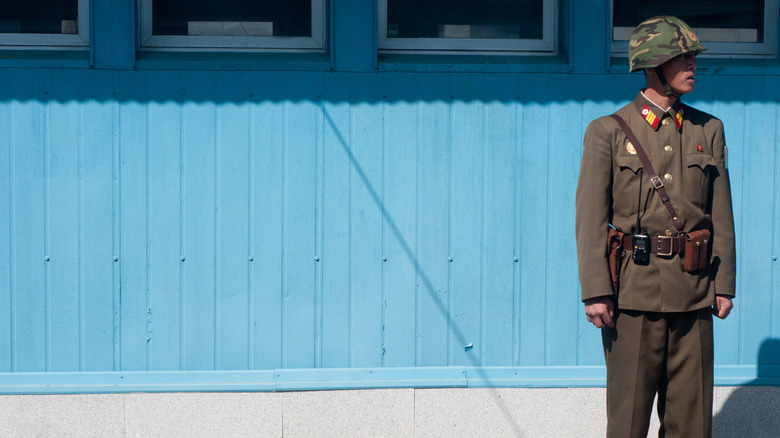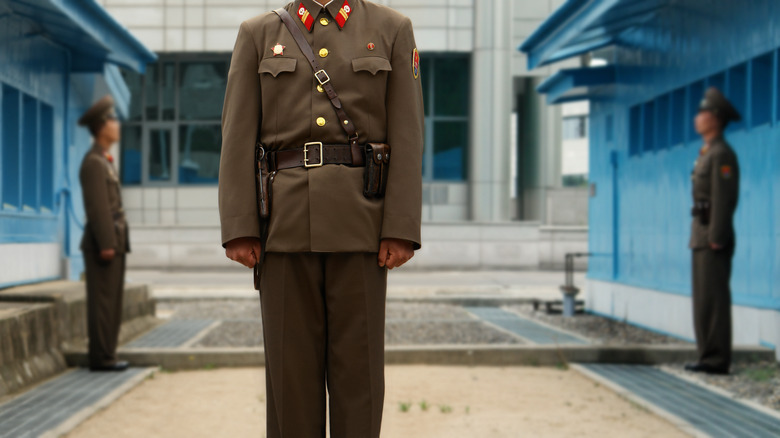Can You Travel To North Korea (And What Happens If You're Detained)?
As of 2023, U.S. citizens are not allowed to travel to North Korea without special permission from the Secretary of State, which is rarely granted, according to the U.S. Department of State website. And the reasons why travel is limited to the small East Asian country, the agency's website explains, include the risk of arrest and detainment by the North Korean Government, or the Democratic People's Republic of Korea (DPRK).
In late July 2023, U.S. Army Private Travis T. King, stationed in South Korea and scheduled to return to the U.S. to face disciplinary action, fled to communist North Korea and was likely taken into custody, according to U.S. Defense Secretary Lloyd Austin (via Reuters). Instances of Westerners crossing over from South to Korea are rare, but a number of American citizens have done so in the recent past and were subsequently arrested, BBC News reports.
In each case, there were different outcomes, as well as different motivating factors as to why those individuals chose to enter a country known for human rights abuse, per Amnesty International. According to CNN, though, Westerners detained in North Korea are first interrogated, often put on trial, and sometimes sentenced to hard labor. Meanwhile, massive diplomatic efforts are typically required to secure their freedom.
Otto Warmbier was arrested in 2016
Westerners imprisoned in North Korea haven't always defected — defined by Cambridge Dictionary as leaving one's country for another country designated an enemy or competing state. In some cases, journalists, researchers, and even tourists inside North Korea were taken into custody. In 2016, U.S. college student Otto Warmbier was arrested after entering the country with a Chinese tour group.
Warmbier was detained and accused of stealing a political poster. He was put on trial, which lasted about an hour, and sentenced to 15 years of hard labor, but instead was sent home 17 months later with severe brain damage and died days later. In the case of Kenneth Bae, the longest-held American citizen imprisoned in North Korea, that labor included grueling work from "from 8 a.m. to 6 p.m. at night working on the field, carrying rock, shoveling coal," Bae told CNN.
Bae was ostensibly in North Korea leading a tour group, but according to North Korean officials, was engaged in missionary work, which is outlawed by the DPRK, The New York Times reports. According to Bae, North Korean officials said to him (via CNN), "No one remembers you. You have been forgotten by people, your government. You're not going home anytime soon. You'll be here for 15 years. You'll be 60 before you go home."
Bae was released in 2014, along with another U.S. citizen, Matthew Todd Miller after a diplomatic visit from Director of National Intelligence James Clapper. Miller entered North Korea intending to defect, according to The Guardian.
Questions remain about why Private King entered North Korea
Per Reuters, U.S. Army Private Travis T. King had served time in South Korea for undisclosed reasons and was on his way back to the United States to face further military action when he fled the airport after passing security alone. He then joined a tour group set to visit the Panmunjom truce village near the demilitarized zone (DMZ) between North and South Korea. While there, he broke away from the group and crossed the border.
CNN reported the disciplinary action against King in South Korea, for which he was set to face further disciplinary action in the U.S., may be assault related. After King crossed the DMZ, his status as well as why he might have done so were uncertain. According to former U.S. official Victor Cha of the Center for Strategic and International Studies (via Reuters), individuals like King inside North Korea might be held for weeks if not months, "for propaganda purposes (especially if this is a U.S. soldier) before a coerced confession and apology," Cha said.
If King had truly tried to defect to North Korea, it will be up to the North Korean government to accept or reject him. According to Yang Moo-jin, president of the University of North Korean Studies in South Korea, speaking with the Associated Press, King will likely be used by the DPRK, "for propaganda purposes in the short term and then as a bargaining chip."


